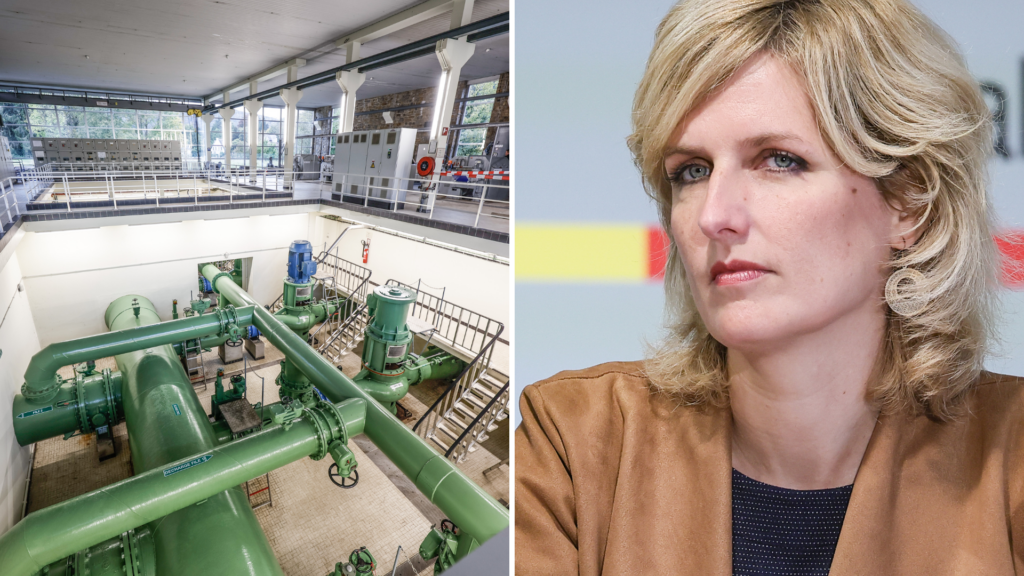Wallonia's Environment Minister Céline Tellier – at the centre of the revelations of tapwater contaminated with PFAS – on Tuesday defended herself at a hearing in the regional parliament, insisting that she was unaware of any health hazard.
Tellier was taken to task during a special session in the parliament over revelations that residents of 12 villages in the Ath region, including Chièvres, had been supplied with water contaminated with PFAS between October 2021 and March 2023. Commonly referred to as "forever chemicals", per- and polyfluoroalkyl substances (PFAS) are man-made compounds that don’t break down in the environment.
The Walloon water company SWDE and the administration reportedly knew that the water had PFAS levels that exceeded thresholds set by the European Food Safety Authority.
Pressed on the matter, Tellier went into detail about the chronology of events, from the first warnings by US military in 2017 to the recent revelations following an RTBF report into the pollution. "I can tell you in all honesty that I have at no time received any information about an imminent health hazard," she said, referring in particular to an email received by one of her colleagues on 10 January 2022.
"That message, which was processed by my cabinet, did not contain a specific warning. It was simply a transmission of information. It was not forwarded internally either. No warning letter was sent either by the administration or the Walloon Water Company (SWDE). The government commissioner of SWDE was not informed either. That only happened in May 2023 when the levels exceeded the norm."
No resignation
Following RTBF's broadcast, Tellier met with the seven municipalities concerned, the SWDE, and the authorities to issue public recommendations to mitigate any health risks.
This concluded that tap water can be consumed in Chièvres but that more detailed environmental analyses are required in the Nimy and Feluy areas. Any necessary measures will be decided thereafter and voluntary blood tests will be offered to locals based on these environmental results.
"Pending the results of the environmental analyses, residents of the communes of Chièvres, Leuze-en-Hainaut, Beloeil, Ath, Mons, Ecaussinnes and Seneffe are advised to avoid eating eggs and vegetables from local production (vegetable garden, domestic hens)," Tellier stated last week.
While the issue is being actively investigated, Tellier has faced widespread criticism regarding a lack of transparency and unclear communication as people in the affected villages and towns were not informed about the pollution.
But on Tuesday she categorically ruled out resigning: "I am not attached to power... But I am committed to making fundamental changes. I will honour that commitment until the last day of this legislature. The work is not over."
Related News
- PFAS water pollution: Brussels Minister called into Parliament to 'not create a panic'
- PFAS water pollution: Walloon municipality seeks further contamination level tests
- Belgium in Brief: Thinking twice about the tap water
Tellier has undertaken a series of measures since 2021 to improve knowledge about PFAS in Wallonia and reduce citizens' exposure to the harmful substances. "I've spent half my life fighting pollution and I've always supported the precautionary principle." She added that Wallonia will have to move towards greater transparency, adopting a preventive approach "that puts precaution at the heart of public authorities."
The minister stressed that the chemical sector "must reinvent itself to move from a post-war chemistry to a green chemistry" and that impunity regarding the substances they release should end.
"The media coverage of this case should serve as a springboard for a global strategy to combat PFAS, these vicious substances that are everywhere. We need a global approach to these chemical substances."
The Brussels Minister for the Environment, Alain Maron, will face a hearing in the Brussels parliamentary environment committee on Wednesday regarding concerns about the safety of Brussels drinking water.

